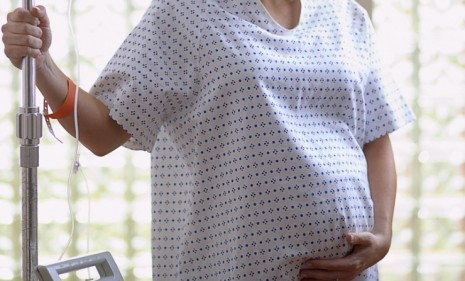Why are more pregnant women having strokes?
The elderly aren't the only ones at risk for strokes, which are increasingly striking women shortly before or after they give birth

A free daily email with the biggest news stories of the day – and the best features from TheWeek.com
You are now subscribed
Your newsletter sign-up was successful
Pregnant women and new mothers are facing a growing risk of stroke, according to the Centers for Disease Control and Prevention. The overall hospitalization rate remains relatively low — of the roughly 4 million women who give birth in the U.S. each year, 6,300 were afflicted by pregnancy related strokes in 2006-07. But the number is rising, fast. Three key questions:
How much has the risk of pregnancy-related stroke risen?
Between 1994 and 2007, the rate of hospitalization for strokes rose by 47 percent for pregnant women, and by 83 percent for mothers who'd given birth within three months, the Centers for Disease Control and Prevention said in a study published in the Journal of the American Heart Association. That still amounts to just 0.22 stroke hospitalizations per 1,000 deliveries, but the sharp increase surprised the researchers. "We were alarmed," says the lead author of the study, Elena Kuklina, as quoted by AFP. "We expected to see some increase, but we were surprised by the amount."
The Week
Escape your echo chamber. Get the facts behind the news, plus analysis from multiple perspectives.

Sign up for The Week's Free Newsletters
From our morning news briefing to a weekly Good News Newsletter, get the best of The Week delivered directly to your inbox.
From our morning news briefing to a weekly Good News Newsletter, get the best of The Week delivered directly to your inbox.
What could be causing the increased stroke risk?
A lot of potential culprits may be contributing to the problem, including obesity among pregnant women (an issue with one in five pregnant women in the U.S.), along with diabetes and high blood pressure. Many women are having children into their 40s, and the risk of stroke rises with age.
Is there any way to reverse the trend?
Education and screening could be key. "We need to be more aggressive in screening these women for these risk factors," says Dr. Olajide Williams, a neurologist at Columbia University and Harlem Hospital and an American Stroke Association spokesman, as quoted by the Associated Press. Another potential step could be simply making more women aware that stroke isn't just something that hits the elderly. And families can help make sure women get treatment quickly by being more aware about the common stroke symptoms, such as numbness or weakness on one side, severe unexplained headache, and trouble walking or speaking.
A free daily email with the biggest news stories of the day – and the best features from TheWeek.com
Sources: Wall St. Journal, Baby Center, Babble, GlobalPost
-
 Quentin Deranque: a student’s death energizes the French far right
Quentin Deranque: a student’s death energizes the French far rightIN THE SPOTLIGHT Reactions to the violent killing of an ultra-conservative activist offer a glimpse at the culture wars roiling France ahead of next year’s elections.
-
 Secured vs. unsecured loans: how do they differ and which is better?
Secured vs. unsecured loans: how do they differ and which is better?the explainer They are distinguished by the level of risk and the inclusion of collateral
-
 ‘States that set ambitious climate targets are already feeling the tension’
‘States that set ambitious climate targets are already feeling the tension’Instant Opinion Opinion, comment and editorials of the day